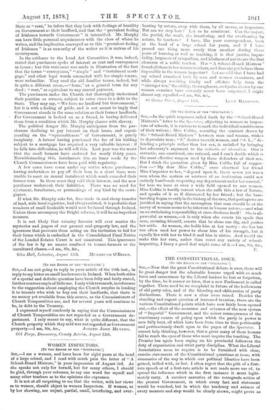[To THE EDITOR OF THE “SPECTATOR."j SI11,—In the quick responses
called forth by the " School-Board Mistress's" letter to the Sp«.t«tor, objecting to women as inspec- tors of schools, it is curious to remark the individual sensitiveness of their writers ; Miss Cobbe, resenting the contrast drawn by the "School-Board Mistress" between man and woman, wishes to depreciate man ; "S." desires to exalkwomen, and "S. L.," de- fending a principle rather than her sex, is satisfied by bringing her adversary's argument to the reductio ad absurdum. One is sarcastic, one emotional, one rational, and I can't decide which is the most effective weapon used by these defenders of their sex. But I think the quotation given by Miss Cobbe full of sugges- tion :—" My dear Miss Cobbe," once observed her friend Miss Carpenter to her, "depend upon it, there never yet was a man whom the matron or mistress of an institution could not entirely bamboozle respecting any department.under her control," for here we have at once a wide field opened to our women. Miss Cobbe is hardly correct when she calls this a law of Nature, and speaks of it as if discovered by her friend ; but the bam- boozling began so early in the history of the race, that perhaps we are justified in saying that the assumption that man should be at the mercy of woman seems to be inherent in human nature,—and what an overwhelming responsibility at once discloses itself ! She is all- powerful as woman,—it is only when she covets his spade that man, arousing himself, asserts that he alone can dig, and pushes her aside. As woman, she holds him at her mercy ; she has but too often used her power to shear him of his strength, but it equally lies with her to bind it and him in virtue. And would she make this her care, rather than covet any variety of school- inspecting, I fancy a good deal might come of it.—I am, Sir, &c.,
F.






























 Previous page
Previous page